Add this eBook to your basket to receive access to all 253 records. Our indexes include entries for the spelling tinker. In the period you have requested, we have the following 253 records (displaying 121 to 130): These sample scans are from the original record. You will get scans of the full pages or articles where the surname you searched for has been found. Your web browser may prevent the sample windows from opening; in this case please change your browser settings to allow pop-up windows from this site. Masters of Merchantmen and Shippers
(1851)
The London Mercantile Journal and Colonial Advocate, a weekly newspaper, published a report entitled Ships Entered Outwards, listing vessels registered with customs in the Port of London as preparing to leave for abroad. Under each day's heading each entry gives, first, the main port of destination; then the name of the ship; then the surname of the captain; nationality of the ship (e. g., B for British, D for Dutch, &c.); tonnage; the dock (e. g., W I D for West India Dock); and the name of the shipper or agent. These are the returns for July 1851. (The sample scan is from February) | Sample scan, click to enlarge

| Masters of Merchantmen and Shippers
(1851)
The London Mercantile Journal and Colonial Advocate, a weekly newspaper, published a report entitled Ships Entered Outwards, listing vessels registered with customs in the Port of London as preparing to leave for abroad. Under each day's heading each entry gives, first, the main port of destination; then the name of the ship; then the surname of the captain; nationality of the ship (e. g., B for British, D for Dutch, &c.); tonnage; the dock (e. g., W I D for West India Dock); and the name of the shipper or agent. These are the returns for November 1851. (The sample scan is from February) | Sample scan, click to enlarge

| Pupil Teachers in Lancashire: Boys
(1851)
The Committee of Council on Education awarded annual grants for the training and support of pupil teachers and stipendiary monitors in schools in England, Wales, Scotland, the Isle of Man and the Channel Islands. Pupil teachers started training between the ages of 13 and 15, and 'must not be subject to any bodily infirmity likely to impair their usefulness as Pupil Teachers, such as scrofula, fits, asthma, deafness, great imperfections in the sight or voice, the loss of an eye from constitutional disease, or the loss of an arm or leg, or the permanent disability of either arm or leg, curvature of the spine, or a hereditary tendency to insanity'.
They also had to obtain certificates from the managers of the school (and their clergyman, in the case of Church of England schools) as to their moral character and that of their family; good conduct; punctuality, diligence, obedience, and attention to duty; and attentiveness to their religious duties.
This detailed statement in the annual report of the committee for the year ending 31 October 1851 lists schools by county, giving:
1. Name and Denomination of School, with these abbreviations - B, British and Foreign School Society; F. C., Free Church of Scotland; H. C., Home and Colonial School Society; N., National Society, or connected with the Church of England; R. C., Roman Catholic Poor-School Committee; Wesn., Wesleyan Methodist.
2. Annual grants conditionally awarded by the committee in augmentation of teachers' salaries, and in stipends to apprentices, and gratuities to teachers.
3. Month in which annual examination was to be held.
4. Names of apprentices, giving surname and initials, and year of apprenticeship. Stipendiary monitors are indicated by (S. M.). | Sample scan, click to enlarge
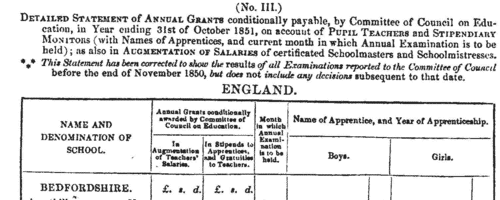
| Pupil Teachers in Wiltshire: Boys
(1851)
The Committee of Council on Education awarded annual grants for the training and support of pupil teachers and stipendiary monitors in schools in England, Wales, Scotland, the Isle of Man and the Channel Islands. Pupil teachers started training between the ages of 13 and 15, and 'must not be subject to any bodily infirmity likely to impair their usefulness as Pupil Teachers, such as scrofula, fits, asthma, deafness, great imperfections in the sight or voice, the loss of an eye from constitutional disease, or the loss of an arm or leg, or the permanent disability of either arm or leg, curvature of the spine, or a hereditary tendency to insanity'.
They also had to obtain certificates from the managers of the school (and their clergyman, in the case of Church of England schools) as to their moral character and that of their family; good conduct; punctuality, diligence, obedience, and attention to duty; and attentiveness to their religious duties.
This detailed statement in the annual report of the committee for the year ending 31 October 1851 lists schools by county, giving:
1. Name and Denomination of School, with these abbreviations - B, British and Foreign School Society; F. C., Free Church of Scotland; H. C., Home and Colonial School Society; N., National Society, or connected with the Church of England; R. C., Roman Catholic Poor-School Committee; Wesn., Wesleyan Methodist.
2. Annual grants conditionally awarded by the committee in augmentation of teachers' salaries, and in stipends to apprentices, and gratuities to teachers.
3. Month in which annual examination was to be held.
4. Names of apprentices, giving surname and initials, and year of apprenticeship. Stipendiary monitors are indicated by (S. M.). | Sample scan, click to enlarge
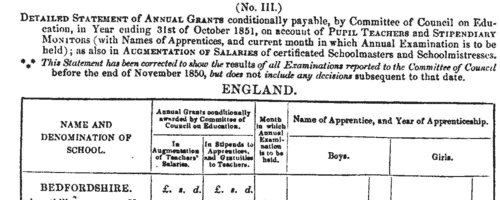
| North Lincolnshire Non-Voters: Spilsby Polling District
(1852)
The Poll Book for North Lincolnshire (Lindsey) in the General Election of 1852 was prepared from the poll clerks' lists, and so is arranged polling district by polling district, and within those by township or parish, but with non-voters listed separately at the end of each polling district. The 9,620 voters are listed not by residence, but by the parish or township in which lay the property that gave the right to vote: consequently 260 electors appear twice on the register. 1,797 did not vote. Many of the electors lived outside the area, or even outside the county. The names are listed roughly alphabetically by surname, with christian name, residence and occupation: with a key to the nature of their property (freehold fr, rented rt, or copyhold ch), and for whom the votes were cast (CR.: Rt. Hon. R. A. Christopher, who received 5,585 votes; CH.: Sir Montague J. Cholmeley, 4,777; S.: James Banks Stanhope, 5,575). Each elector had two votes. The franchise comprised all adult males in possession of 40s freehold, or £10 copyhold or leasehold, annual value. At the end of each polling district is a list of electors who did not vote, many living at a distance from the area. | Sample scan, click to enlarge
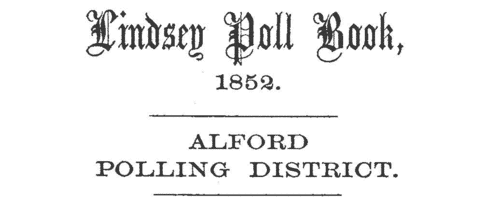
| North Lincolnshire Voters: Haxey
(1852)
The Poll Book for North Lincolnshire (Lindsey) in the General Election of 1852 was prepared from the poll clerks' lists, and so is arranged polling district by polling district, and within those by township or parish, but with non-voters listed separately at the end of each polling district. The 9,620 voters are listed not by residence, but by the parish or township in which lay the property that gave the right to vote: consequently 260 electors appear twice on the register. 1,797 did not vote. Many of the electors lived outside the area, or even outside the county. The names are listed roughly alphabetically by surname, with christian name, residence and occupation: with a key to the nature of their property (freehold fr, rented rt, or copyhold ch), and for whom the votes were cast (CR.: Rt. Hon. R. A. Christopher, who received 5,585 votes; CH.: Sir Montague J. Cholmeley, 4,777; S.: James Banks Stanhope, 5,575). Each elector had two votes. The franchise comprised all adult males in possession of 40s freehold, or £10 copyhold or leasehold, annual value. | Sample scan, click to enlarge
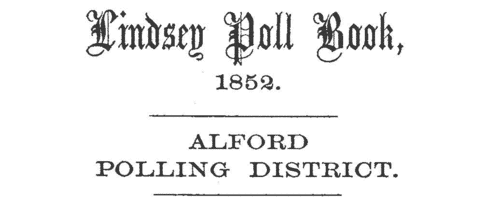
| North Lincolnshire Voters: Thorpe
(1852)
The Poll Book for North Lincolnshire (Lindsey) in the General Election of 1852 was prepared from the poll clerks' lists, and so is arranged polling district by polling district, and within those by township or parish, but with non-voters listed separately at the end of each polling district. The 9,620 voters are listed not by residence, but by the parish or township in which lay the property that gave the right to vote: consequently 260 electors appear twice on the register. 1,797 did not vote. Many of the electors lived outside the area, or even outside the county. The names are listed roughly alphabetically by surname, with christian name, residence and occupation: with a key to the nature of their property (freehold fr, rented rt, or copyhold ch), and for whom the votes were cast (CR.: Rt. Hon. R. A. Christopher, who received 5,585 votes; CH.: Sir Montague J. Cholmeley, 4,777; S.: James Banks Stanhope, 5,575). Each elector had two votes. The franchise comprised all adult males in possession of 40s freehold, or £10 copyhold or leasehold, annual value. | Sample scan, click to enlarge
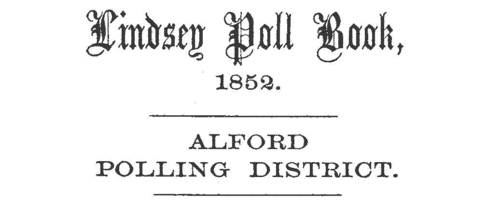
| North Lincolnshire Voters: West Rasen
(1852)
The Poll Book for North Lincolnshire (Lindsey) in the General Election of 1852 was prepared from the poll clerks' lists, and so is arranged polling district by polling district, and within those by township or parish, but with non-voters listed separately at the end of each polling district. The 9,620 voters are listed not by residence, but by the parish or township in which lay the property that gave the right to vote: consequently 260 electors appear twice on the register. 1,797 did not vote. Many of the electors lived outside the area, or even outside the county. The names are listed roughly alphabetically by surname, with christian name, residence and occupation: with a key to the nature of their property (freehold fr, rented rt, or copyhold ch), and for whom the votes were cast (CR.: Rt. Hon. R. A. Christopher, who received 5,585 votes; CH.: Sir Montague J. Cholmeley, 4,777; S.: James Banks Stanhope, 5,575). Each elector had two votes. The franchise comprised all adult males in possession of 40s freehold, or £10 copyhold or leasehold, annual value. | Sample scan, click to enlarge
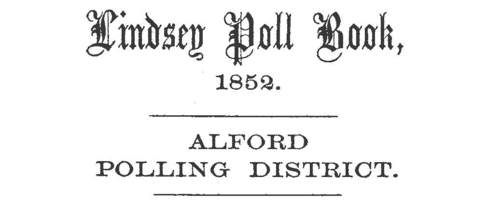
| North Lincolnshire Voters: Woodhall
(1852)
The Poll Book for North Lincolnshire (Lindsey) in the General Election of 1852 was prepared from the poll clerks' lists, and so is arranged polling district by polling district, and within those by township or parish, but with non-voters listed separately at the end of each polling district. The 9,620 voters are listed not by residence, but by the parish or township in which lay the property that gave the right to vote: consequently 260 electors appear twice on the register. 1,797 did not vote. Many of the electors lived outside the area, or even outside the county. The names are listed roughly alphabetically by surname, with christian name, residence and occupation: with a key to the nature of their property (freehold fr, rented rt, or copyhold ch), and for whom the votes were cast (CR.: Rt. Hon. R. A. Christopher, who received 5,585 votes; CH.: Sir Montague J. Cholmeley, 4,777; S.: James Banks Stanhope, 5,575). Each elector had two votes. The franchise comprised all adult males in possession of 40s freehold, or £10 copyhold or leasehold, annual value. | Sample scan, click to enlarge
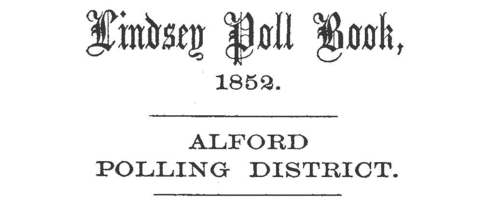
| Inhabitants of Bradford, Yorkshire
(1853)
William White's directory lists traders, farmers and private residents in the area. | Sample scan, click to enlarge
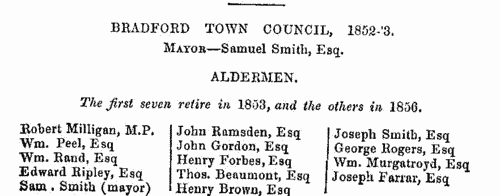
|
Research your ancestry, family history, genealogy and one-name study by direct access to original records and archives indexed by surname.
|











